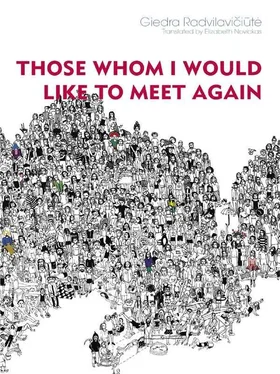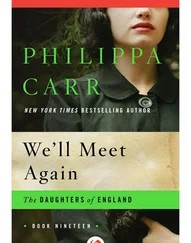Broad-faced Mexicans with carts would drive by Alicija’s house. They would sell mangos full of juice as sticky as honey, corn mounted on a stick so it would be easier to gnaw, and sliced papayas, whose black seeds shone like giant caviar. A small truck playing music would drive by from time to time as well. You could stop it anywhere and buy yourself ice cream. On warm nights lightning bugs flew about in the dark street next to the house. It seemed to Alicija that her invisible aunts and uncles from Poznan, with cigarettes burning green in their mouths, were zooming up and down the sidewalk. Her mother missed those aunts very much. In the evenings her mother would be in a bad mood. Because she cleaned Americans’ houses, and her back hurt, and because she had nonetheless to write only cheerful letters to her relatives. “Be glad you decided not to return …” “Since you left, nothing has changed in Poland …” “I’m blind with envy for you …” That’s more or less how her relative’s replies would begin. One time her mother cried while talking to someone back home on the telephone. An aunt had died in some village. She couldn’t go to the funeral because she had only seven hundred dollars saved up, and wouldn’t have been able to fly back to the States. Later, Alicija would learn that almost every immigrant fails to bury their loved ones. Later still, she’ll be in an American funeral home: everything will look like a birthday party, at least the way they were celebrated in Poznan, except that the birthday boy or girl is lying in a coffin. Her mother will tell her that when the old lady, the American she took care of on weekends, was dying in her arms, she yelled for her relatives on the second story of the house to come down, but they were too afraid. Her mother will say that to stand next to a dying person and afterward close their eyes is called “old-fashioned” here. Alicija will then get upset that her mother can’t pronounce such ordinary words without an accent. Even the word “water” would give her mother away as a foreigner. After two years of school, Alicija will learn how to fold a paper flower in class. Her mother will ask Alicija to demonstrate. Alicija will say, “You take the paper, fold it in half, turn up the corners, and even them out.” Her mother will ask her to say it in Polish. Alicija will say, “You take the paper, take it in half, take it like this, and then take it like that.” After a few years it will seem to Alicija that speaking Polish is like climbing into the house through a window when the door is wide open.
Alicija will come to like eating French fries alone at the fast-food restaurant next to her house, watching through the window how cheerfully the black bus drivers change shifts. On the bag her food comes in is a drawing of clouds and something about the food being the best in the world.
Alicija will visit a theater where only Shakespeare’s plays are put on. After the play, while everyone is applauding, from somewhere up above, a portrait of Shakespeare the size of a sail will descend, wearing a Michael Jordan T-shirt. On a class field trip, Alicija will go to the Art Institute to see Degas paintings and sculptures brought together from all over the world. She will like the women combing their hair best. It will seem to her that combing their hair was the peak of those women’s development. She will go to the Museum of Science and Industry with her mother. Alicija will finally see the part of the Apollo ship the Americans first rode to the moon. Alongside all the other artifacts, there will be a bottle of brandy; the astronauts had taken it along and brought it home again unopened. (Her mother will enjoy watching a live chick breaking out of its egg the most.)
After a few more years, Alicija will start understanding television news anchors, despite the speed at which they speak. She will see that whenever bombs start exploding somewhere in the world, or there’s some despot trying to claim another country’s land, most often things don’t begin working out until America interferes. During those years, almost all her relatives in Poland will try to win green cards in the lottery. Some will succeed. And when they come over, they’ll even live for a bit with Alicija and her mother while they look for an apartment. (They’ll say to her mother that they left all the worst things in their life behind in Poland.) And Alicija will understand that the whole world is here. You just need to succeed. Not be like her mother, eternally cleaning houses. But Alicija will still dream of Poznan for many more years — most often the courtyard of a five-story apartment building, the shining tramway rails, and poppy seed cake. The same cake they used to sell at Bobak’s. Right there, around the corner.
POSTSCRIPT
The summer I came back from America for good, my daughter got a wart on her foot. The doctor, who cured warts with a laser, said that if it were her own child, she would try curing the wart with tetterwort juice. It takes patience, but there would be no need for anesthetics, which apparently do terrible things to the memory. (I find nothing so frightening as whatever might harm the memory or the sight.) Tetterwort, it turns out, grows everywhere in Vilnius. Particularly in old courtyards. Almost every evening for two months we picked some in the courtyard of the Basilian monastery. Nyka-Nili  nas, the one time he returned to Lithuania, wrote that he too visited the Basilian courtyard, brutally neglected by God and man, which “utterly stunned me with its mysteries as dense as the granite walls.” I’ve known for a long time that a place can be described as accurately by an impression as by a fact. (If the poet hadn’t lived in America for forty years, his impression most likely wouldn’t have contained the words “brutally neglected.”) Another poet, Adomas Mickevi
nas, the one time he returned to Lithuania, wrote that he too visited the Basilian courtyard, brutally neglected by God and man, which “utterly stunned me with its mysteries as dense as the granite walls.” I’ve known for a long time that a place can be described as accurately by an impression as by a fact. (If the poet hadn’t lived in America for forty years, his impression most likely wouldn’t have contained the words “brutally neglected.”) Another poet, Adomas Mickevi  ius, who spent half a year imprisoned in this same courtyard, was exiled for all time by order of the tsar, and was never able to return to Lithuania again — not even once.
ius, who spent half a year imprisoned in this same courtyard, was exiled for all time by order of the tsar, and was never able to return to Lithuania again — not even once.
My girl sat on the boards and poked at her wart with a broken-open tetterwort — the orange juice turns black on the skin. My mother told me that her mother had told her that you can heal warts with a linen string. You should tie as many knots in it as there are warts and bury it under running water. When the string rots, the warts will disappear. A nightingale sang on the Basilian’s bell tower. At six o’clock in the evening. In the middle of Vilnius. It smelled of fresh-cut boards.
I knew I would feel the same way standing in many of Vilnius’s other courtyards. As Günter Grass said about memory, all the sluices were open. “Everything was right there again, within reach.” There really was a giant magnet buried underground, holding me here as easily as a metal shaving. One’s native land is nothing more than this connection …
A few decades ago, the Basilian courtyard smelled like washed (and unwashed) wine barrels to the little Ri  ardas Gavelis. Back then, children found German telescopes in the basement of the church. There were no nightingales singing in the tower; someone was raising pigeons there. He developed a real hatred of those birds. The pigeons, in revenge, gifted the aging writer with a bird’s eyelids and stare. At approximately the same time, my uncle was learning English and Spanish in that same courtyard. The dean of foreign languages at the Pedagogical Institute was a Jew. The freshmen always tried to follow him to one of the bathrooms without stalls, so that the barriers between them and the greatest secret of Jewish manhood would fall down like a pair of pants. The dean, due to his secret’s disproportionate size in relation to his height, would try to hide it with both hands. Seeing that was a real education.
ardas Gavelis. Back then, children found German telescopes in the basement of the church. There were no nightingales singing in the tower; someone was raising pigeons there. He developed a real hatred of those birds. The pigeons, in revenge, gifted the aging writer with a bird’s eyelids and stare. At approximately the same time, my uncle was learning English and Spanish in that same courtyard. The dean of foreign languages at the Pedagogical Institute was a Jew. The freshmen always tried to follow him to one of the bathrooms without stalls, so that the barriers between them and the greatest secret of Jewish manhood would fall down like a pair of pants. The dean, due to his secret’s disproportionate size in relation to his height, would try to hide it with both hands. Seeing that was a real education.
Читать дальше

 nas, the one time he returned to Lithuania, wrote that he too visited the Basilian courtyard, brutally neglected by God and man, which “utterly stunned me with its mysteries as dense as the granite walls.” I’ve known for a long time that a place can be described as accurately by an impression as by a fact. (If the poet hadn’t lived in America for forty years, his impression most likely wouldn’t have contained the words “brutally neglected.”) Another poet, Adomas Mickevi
nas, the one time he returned to Lithuania, wrote that he too visited the Basilian courtyard, brutally neglected by God and man, which “utterly stunned me with its mysteries as dense as the granite walls.” I’ve known for a long time that a place can be described as accurately by an impression as by a fact. (If the poet hadn’t lived in America for forty years, his impression most likely wouldn’t have contained the words “brutally neglected.”) Another poet, Adomas Mickevi  ius, who spent half a year imprisoned in this same courtyard, was exiled for all time by order of the tsar, and was never able to return to Lithuania again — not even once.
ius, who spent half a year imprisoned in this same courtyard, was exiled for all time by order of the tsar, and was never able to return to Lithuania again — not even once.










